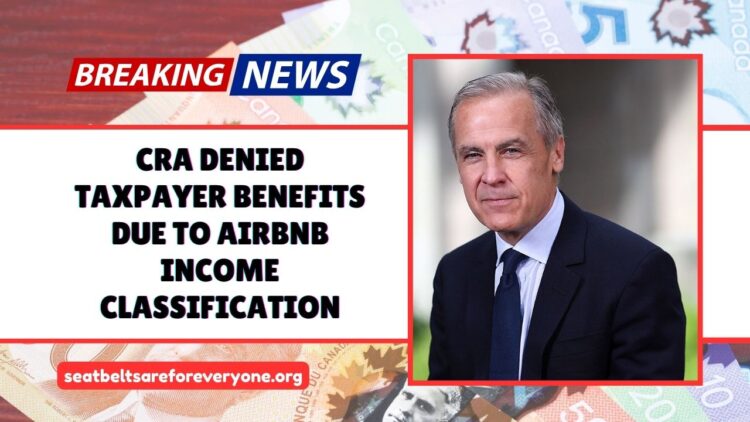he Canada Revenue Agency (CRA) has issued a strong reminder to Canadians operating short-term rentals through platforms like Airbnb or Vrbo: how you classify your rental income on your tax return can make or break your access to government benefits.
A recent case highlights how a taxpayer lost access to federal COVID-19 benefits because the CRA classified his Airbnb earnings as rental income instead of self-employment income.
Why Income Classification Matters
The CRA distinguishes between rental income and business (self-employment) income, and this difference impacts:
- How you file taxes (Form T776 vs. Form T2125)
- What expenses you can deduct
- Whether you need to contribute to the Canada Pension Plan (CPP)
- Eligibility for certain government benefits
When income is considered rental income, it does not qualify as “earned income” under the Income Tax Act. That means taxpayers cannot use it to meet eligibility thresholds for programs like CERB, CRB, or CWLB, which required at least $5,000 in employment or self-employment income during specific periods.
CRA’s Rules on Short-Term Rental Income
To determine whether your Airbnb income counts as rental income or business income, the CRA looks at the services provided:
- Rental income: If you only provide basic services such as heat, utilities, internet, parking, or laundry facilities.
- Business income: If you provide additional services, like meals, daily cleaning, or security. The more services offered, the more likely the CRA will classify the income as self-employment.
The Airbnb Case in Court
In this case, the taxpayer had earned money through Airbnb before and during the pandemic. Key facts include:
- He had reported Airbnb earnings as rental income between 2016 and 2019.
- In 2020 and 2021, he reported no other employment income besides government benefits.
- His Airbnb activity mostly involved cleaning and preparing for the next guest — no significant extra services were provided.
- As a result, the CRA determined the income was rental income, not self-employment.
Because of this classification, the taxpayer was found ineligible for pandemic benefits, since rental income doesn’t meet the definition of earned income for those programs. The Federal Court agreed with the CRA’s decision.
New Rules for Short-Term Rentals
Starting in 2024, new federal tax rules tightened compliance for short-term rentals:
- In municipalities where short-term rentals are restricted or banned, taxpayers cannot deduct related expenses such as mortgage interest or utilities.
- If operators do not comply with provincial or municipal licensing requirements, the CRA can deny deductions.
This means compliance is now doubly important — both for income classification and for tax deductions.
CPP and Benefit Implications
- Rental income: Not subject to CPP contributions.
- Business income: Requires both employer and employee portions of CPP, totaling 11.9% in 2025, up to a maximum of $7,735.
At the same time, business income counts as earned income, which is used for:
- Claiming child care expense deductions (up to two-thirds of earned income).
- Meeting eligibility thresholds for benefits like CERB or CRB.
Example: Impact of Classification
| Category | Rental Income | Business Income |
|---|---|---|
| Tax Form | T776 (Real Estate Rentals) | T2125 (Business or Professional Activities) |
| CPP Contributions | No | Yes (11.9% in 2025, up to $7,735) |
| Child Care Expense Deduction | Not eligible | Eligible (based on earned income) |
| COVID-19 Benefit Eligibility | No | Yes (if $5,000+ earned) |
| Deductible Expenses | Pro-rated expenses on property | Wider scope, including business expenses |
Lessons for Airbnb Hosts
- Be clear on classification: If you want your rental activity to be considered a business, you must provide additional services beyond basic lodging.
- Keep detailed records: Document expenses and services offered to strengthen your position if CRA reviews your file.
- Consider future benefits: Misclassifying your income could cost you access to government programs, deductions, or credits.
The case of denied COVID-19 benefits serves as a cautionary tale for Canadians renting out their homes on platforms like Airbnb. The CRA’s decision to treat the income as rental income meant the taxpayer was ineligible for thousands of dollars in benefits.
With new rules restricting deductions and tighter enforcement, proper classification and compliance are more important than ever. If you’re renting short-term, ensure your tax reporting reflects the reality of your services — it could protect both your income and your benefits.
FAQs
If you only provide basic amenities (utilities, heat, Wi-Fi), it’s usually rental income. If you provide meals, daily cleaning, or other services, it may be business income.
Rental income isn’t considered “earned income,” meaning it can’t be used to qualify for benefits like CERB, CRB, or child care deductions. Business income is.
As of 2024, the CRA may deny your tax deductions for expenses like mortgage interest or utilities if your rental is non-compliant.

